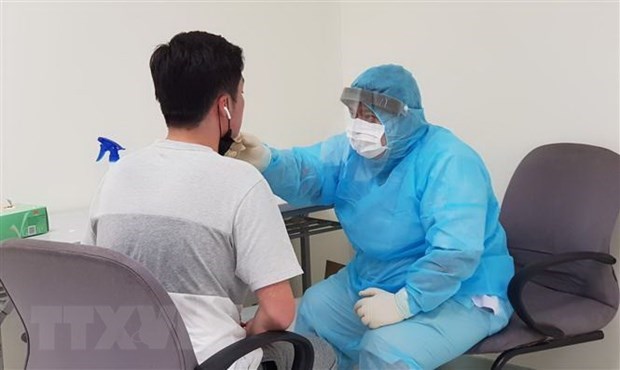NA report looks at COVID-19’s social impacts
Thứ Năm, 26/03/2020, 15:21
Multiple enterprises have closed down or reduced production scale due to the complicated developments of the COVID-19 pandemic, according to a report from the National Assembly’s Committee for Social Affairs.
 |
|
A medical worker gives check-up to a people entering Vietnam from another country at Tan Son Nhat International Airport in Ho Chi Minh City (Photo: VNA) |
Multiple enterprises have closed down or reduced production scale due to the complicated developments of the COVID-19 pandemic, according to a report from the National Assembly’s Committee for Social Affairs.
Industrial production growth has seen the largest drop in the last six and a half years.Production has been delayed due to a lack of raw materials, as a majority of enterprises have depended on materials from China and other markets, the report said, adding that effects caused by the epidemic on the country’s GDP growth are inevitable.
The State will have to deploy economic support packages to help businesses revitalize their production and business, and support labourers, it said.
For the health sector, if the epidemic is prolonged, health facilities will be under pressure and facing difficulties maintaining the operation of the preventive healthcare system. There will be a shortage of medical workers for epidemiological investigation, taking samples for testing, and organizing quarantine, the report said.
It also mentioned the need to prepare enough medical supplies, medicine, and personal protective gear to meet the medium- and long-term disease prevention efforts.
Another problem is the strong reduction in the number of patients seeking treatment at medical facilities, the report said, citing examples at many hospitals in Hanoi with decreases of patients ranging from 30-50 percent.
On one hand, this will affect patients’ health, and on the other hand, hospitals will suffer from decreasing revenues.
Meanwhile, the health insurance fund is also forecast to be seriously impacted if the number of COVID-19 cases surges, it said, clarifying that treatment costs for COVID-19 patients are quite high.
For the field of labour and employment, job loss and unemployment has increased, the report said, citing a quick survey of 1,200 SMEs conducted by the Prime Minister’s advisory board on administrative procedure reform which showed the epidemic has force them to cut workforce or let workers take no-pay leave, as well as cut wages. The enterprises also face a high risk of bankruptcy.
In February alone, about 47,100 unemployed labourers nationwide filed applications for unemployment insurance in February, 63.26 percent higher than in January.
Joblessness and strict compliance with disease prevention regulations will lead to lower purchasing power, the report noted.
According to the Ministry of Labour, Invalids and Social Affairs, about 500,000 Vietnamese guest workers are working under definite-term labour contracts in 36 countries and territories worldwide. So far, no Vietnamese workers have been confirmed positive for the novel coronavirus SARS-CoV-2 in the three main markets of Japan, Taiwan (China) and the Republic of Korea.
The report said so far Vietnamese guest workers are working normally and have not showed wish to go home at this time.
The committee asked the NA Standing Committee to pay special attention to budget allocation and adjustments for the health sector in order to strengthen public healthcare capacity in both general and preventive healthcare.
It also suggested the Government build socio-economic development scenarios on the basis of the epidemic’s development, and in the post-pandemic period, especially arranging and making adjustments to exams and study plans for students in the 2019-2020 academic year.
VNA

